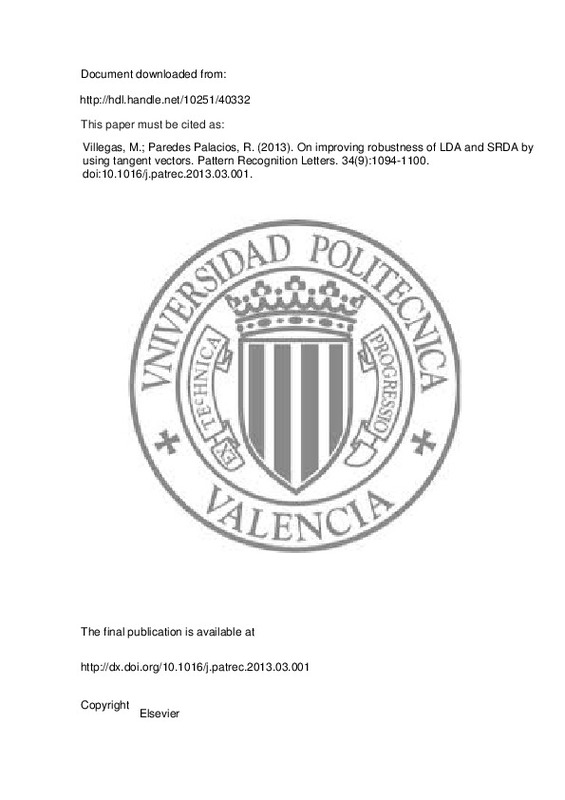Villegas Santamaría, M.; Paredes Palacios, R. (2013). On improving robustness of LDA and SRDA by using tangent vectors. Pattern Recognition Letters. 34(9):1094-1100. https://doi.org/10.1016/j.patrec.2013.03.001
Por favor, use este identificador para citar o enlazar este ítem: http://hdl.handle.net/10251/40332
|
Título:
|
On improving robustness of LDA and SRDA by using tangent vectors
|
|
Autor:
|
Villegas Santamaría, Mauricio
 Paredes Palacios, Roberto
Paredes Palacios, Roberto
|
|
Entidad UPV:
|
Universitat Politècnica de València. Departamento de Sistemas Informáticos y Computación - Departament de Sistemes Informàtics i Computació
|
|
Fecha difusión:
|
|
|
Resumen:
|
[EN] In the area of pattern recognition, it is common for few training samples to be available with respect to the dimensionality of the representation space; this is known as the curse of dimensionality. This problem can ...[+]
[EN] In the area of pattern recognition, it is common for few training samples to be available with respect to the dimensionality of the representation space; this is known as the curse of dimensionality. This problem can be alleviated by using a dimensionality reduction approach, which overcomes the curse relatively well. Moreover, supervised dimensionality reduction techniques generally provide better recognition performance; however, several of these tend to suffer from the curse when applied directly to high-dimensional spaces. We propose to overcome this problem by incorporating additional information to supervised subspace learning techniques using what is known as tangent vectors. This additional information accounts for the possible differences that the sample data can suffer. In fact,
this can be seen as a way to model the unseen data and make better use of the scarce training samples. In this paper, methods for incorporating tangent vector information are described for one classical technique (LDA) and one state-of-the-art
technique (SRDA). Experimental results confirm that this additional information improves performance and robustness to known transformations.
[-]
|
|
Palabras clave:
|
Subspace learning
,
Dimensionality reduction
,
Tangent vectors
,
LDA
,
SRDA
|
|
Derechos de uso:
|
Reserva de todos los derechos
|
|
Fuente:
|
Pattern Recognition Letters. (issn:
0167-8655
)
|
|
DOI:
|
10.1016/j.patrec.2013.03.001
|
|
Editorial:
|
Elsevier
|
|
Versión del editor:
|
http://dx.doi.org/10.1016/j.patrec.2013.03.001
|
|
Código del Proyecto:
|
info:eu-repo/grantAgreement/EC/FP7/600707/EU/tranScriptorium/
info:eu-repo/grantAgreement/MINECO//TIN2012-37475-C02-01/ES/SEARCH IN TRANSCRIBED MANUSCRIPTS AND DOCUMENT AUGMENTATION/
info:eu-repo/grantAgreement/Generalitat Valenciana//PROMETEO09%2F2009%2F014/ES/Adaptive learning and multimodality in pattern recognition (Almapater)/
|
|
Descripción:
|
This is the author’s version of a work that was accepted for publication in Pattern Recognition Letters. Changes resulting from the publishing process, such as peer review, editing, corrections, structural formatting, and other quality control mechanisms may not be reflected in this document. Changes may have been made to this work since it was submitted for publication. A definitive version was subsequently published in Pattern Recognition Letters, [Volume 34, Issue 9, 1 July 2013, Pages 1094–1100]
DOI: 10.1016/j.patrec.2013.03.001
|
|
Agradecimientos:
|
Work partially supported through the EU 7th Framework Programme grant tranScriptorium (Ref: 600707), by the Spanish MEC under the STraDA research project (TIN2012-37475-C02-01) and by the Generalitat Valenciana under grant ...[+]
Work partially supported through the EU 7th Framework Programme grant tranScriptorium (Ref: 600707), by the Spanish MEC under the STraDA research project (TIN2012-37475-C02-01) and by the Generalitat Valenciana under grant Prometeo/2009/014.
[-]
|
|
Tipo:
|
Artículo
|







![[Cerrado]](/themes/UPV/images/candado.png)


